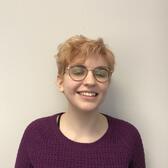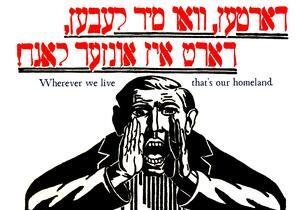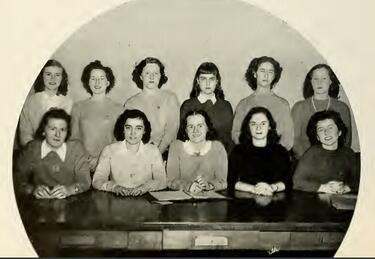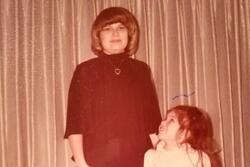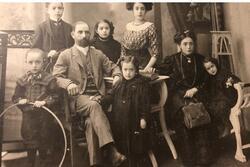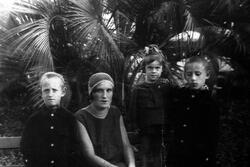Aunt Bev and Me: Jewish Women at a Women’s College
“Wherever we live is our homeland” from a Bundist poster (Kiev, 1918). The image was revived by the band Black Ox Orkestar around 2003/4. The image was posterized with an English translation by Aharon Varady.
My family legend has it that my aunt Beverly Sitrin, a woman who I met only a few times, was the person who brought kosher food to Wellesley College during her undergraduate years there in the 1940s. Now, sixty years later, I’m studying at Wellesley too. I’m a sophomore, making this the second year I’ve ever lived away from my hometown of St. Louis, Missouri. In many ways, coming here felt like making a kind of aaliyah: After spending my whole life in the Midwest, I was returning to the Jewish homeland of the East Coast. Or so I thought. When I got here, I found that I didn’t really fit in with the girls in Hillel, either personally or politically. To make matters worse, most of the family that I grew up hearing stories about—family that supposedly lived up and down this coast—were either estranged or had passed on.
So, where was my Jewish community? I could hardly even find a good bagel in Boston, much less a community that I felt comfortable in. I remembered the stories of my Aunt Bev: upon arriving at Wellesley and realizing that there were no kosher food options, she campaigned until her dreams were realized. After graduating from Wellesley, she became one of the first women to attend Harvard Law—a trailblazer in her field, at a time when the number of women in her year at law school only numbered in the single digits. She lived a long life, and died last year. I regret that, since I lived so far away until I started college, had only ever met her twice.
Now, I eat in the kosher dining hall most days, even though I don’t really keep kosher myself, and I think of her.
Jewish women in my family have always valued education. But attending an elite college means losing access to Jewish community. There are hardly any Jewish students here; we make up about 4% of the total student population. Given that, and the fact that I didn’t fit in with the Hillel crowd, I wasn’t sure what to do.
Eventually, though, some friends and I began doing something different: We created our own Jewish community. I was able to find about 5 or 6 Jewish students that I feel close to, but that was enough. This past Rosh Hashanah, I ate apples and honey in my friend Jun Ru’s room as we thought about our hopes for the upcoming year. On Yom Kippur, a circle of us led by my friend Alyssa sat by the side of the lake, said prayers, and listed how we hoped to be better than we had been in the past. On Hanukkah, I made latkes for a group of us—some Jewish, some not—on the stove in the basement of my dorm.
Jewish womanhood, I think, is about creating communities for ourselves, wherever we are. I think of a poster made by the General Jewish Labor Bund, a secular Jewish socialist party in the former Russian empire in the late 19th and early 20th centuries. The poster depicts an illustration of a person shouting, with bold, insistent text overhead. It reads, “Wherever we live, that’s our homeland.” One of the wonderful things about being part of a diasporic people is our ability to create a homeland for ourselves, no matter where we are. Like Aunt Bev, I saw what is lacking in the Jewish community at Wellesley, and by working together with friends, I created something new.
It may seem strange to some people that I hold so tightly to my identities of “Jew” and “woman.” I am a patrilineal Jew, with a mother who was raised Protestant. This means that to many Jewish people, I don’t count as a real Jew. I’m also queer. This means that to many women, I don’t count as a true woman, either. I think that the feeling of exclusion from the communities that are supposed to be mine is what has made me so intent on creating my own communities based on acceptance and the desire to fight for justice. And the fact that I have sometimes been questioned about whether or not I am in fact “really Jewish” is what has made me insist so intensely upon my status as a Jewish woman, too.
This Friday, as I host a social justice-themed Shabbat dinner, I’ll be thinking of Aunt Bev. I have no idea if she’d agree with who I am as a person—with my politics, with my queerness, with how I dress, even—but I know I’ve learned a great deal from her. She did not provide me with an exact roadmap of how to be a Jewish woman, but she showed me something very important: Wherever Jewish women live, we can and must create our own homes.

